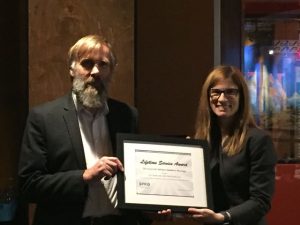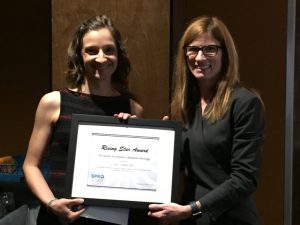CMS Announces Alternative Payment Model
The Centers for Medicare & Medicaid Services proposes an innovative payment model in radiation oncology that will align payment to quality and value instead of volume.
More information located here.
2019 SPRO Annual Meeting
Mark Your Calendars!
SPRO’s 6th Annual Meeting
September 15th, 2019
Chicago, IL
More details to come.
Report from the 5th Annual Meeting
On October 25th, 2018, in association with the American Society for Radiation Oncology’s 60th Annual Meeting in San Antonio, Texas, SPRO held its 5th Annual Meeting. The event was a great success, with 45 members in attendance. Two inaugural awards were announced: the Lifetime Service Award and the Rising Star Award. A report of the Annual Meeting can be found at: http://apm.amegroups.com/article/view/23985/22767


AAHPM Forms a Palliative Radiation Oncology Community
The American Academy of Hospice and Palliative Medicine (AAHPM) recently formed a Palliative Radiation Oncology Community. The group aims to encourage engagement of HPM professionals in promoting palliative radiotherapy and to increase collaboration between palliative care physicians and radiation oncologists. The group will hold its inaugural meeting at AAHPM’s 2019 Annual Assembly in Orlando, Florida. Follow on Twitter @Pall_Rad_Onc
ASTRO membership survey on palliative and supportive care
Just published in PRO! Members of SPRO and ASTRO have completed a national membership survey of radiation oncologists on Palliative and Supportive Care in the United States.
Attitudes of Radiation Oncologists Toward Palliative and Supportive Care in the United States: Report on National Membership Survey by the American Society for Radiation Oncology (ASTRO)
Randy L. Wei, MD, PhD, Malcolm D. Mattes, MD, James Yu, MD, Adrienne Thrasher, Hui-kuo Shu, MD, Harald Paganetti, PhD,Jennifer De Los Santos, MD, Bridget Koontz, MD, Christopher Abraham, MD, Tracy Balboni, M
Background/Purpose
Radiation oncologists are frequently involved in providing palliative and supportive care (PSC) for patients with advanced cancers through delivery of palliative radiation. Whether they are confident in their ability to assess and initiate treatments for pain, non-pain, and psychosocial distress is unknown. The American Society for Radiation Oncology (ASTRO) surveyed its practicing members in the United States on self-assessment of their primary PSC skills, and access to continuing medical education on PSC.
Methods
We electronically surveyed 4093 practicing radiation oncologists in the United States. The survey consisted of 16-questions in five sections: (1) demographics (2) PSC training (3) domains of PSC (4) perceived barriers as a radiation oncologist to initiate advanced care planning, and (5) discussion on prognosis.
Results
The survey was emailed to 4093 ASTRO members and 649 responses were received (response rate 16%). The majority (91%) of radiation oncologists surveyed believe PSC is an important competency for radiation oncologists. Most radiation oncologists reported that they are moderately confident in their ability to assess and manage pain and GI symptoms but less confident in their ability to manage anorexia, anxiety, and depression. Despite areas of decreased confidence, a large number (42%) of radiation oncologists do not receive any additional PSC education beyond their residency training. Lastly, a perceived fear of upsetting referring medical oncologists and lack of clinic time are concerns for radiation oncologists who may want to initiate goals of care/advance care planning discussions with patients and their families.
Conclusion
Radiation oncologists are more confident in their ability to assess and manage pain than in their ability to manage depression, anxiety, anorexia, and fatigue. There is a need for increasing continuing medical educational efforts in PSC for practicing radiation oncologists, and strengthening PSC training in residency programs.





